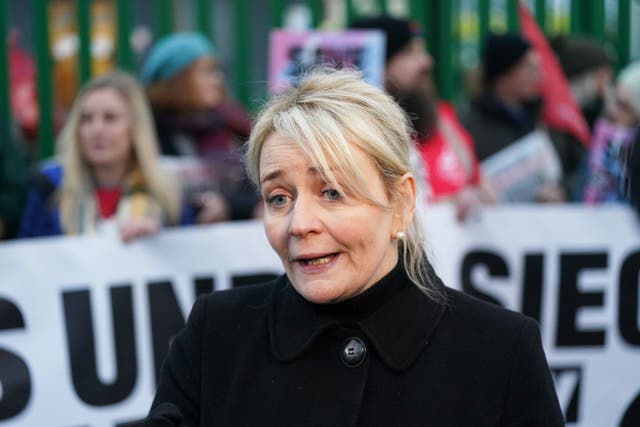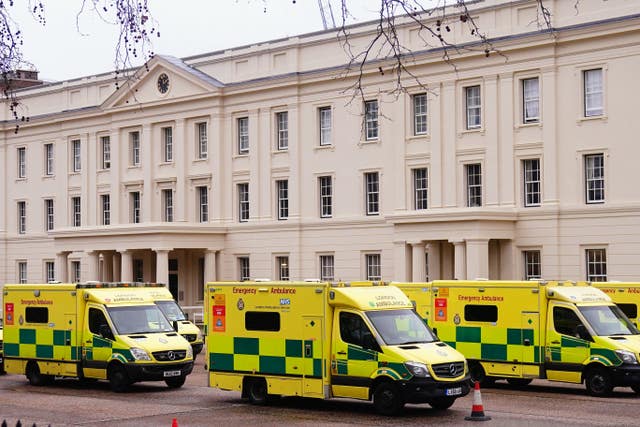Thousands of ambulance workers are staging more strikes as the Chancellor was urged to find the money to pay health workers “fairly” in order to end the walkouts.
Up to 15,000 Unison ambulance workers are striking on Monday for the third time in five weeks, and will be joined by 5,000 of their NHS colleagues at two hospital trusts in Liverpool.
Further strikes are planned in the coming weeks by nurses and other NHS workers.
Unions have accused the Government of not wanting to find a resolution to what has become an escalating and bitter dispute over pay.
Unite general secretary Sharon Graham said a double-digit pay rise must be offered to striking NHS staff, but described the Government as appearing willing to “talk about anything, but they won’t talk about pay”.
Unison general secretary Christina McAnea said the solution is “simple” and “staring the Government in the face” but that “most ministers look like they’d rather dig in and do nothing instead of boost pay”.
Ms McAnea accused Chancellor Jeremy Hunt of “blocking progress”.
Health Secretary Steve Barclay has described having had “constructive talks with unions about this coming year’s pay process for 2023/24” but unions have been calling for the 2022/23 pay award to be reviewed.
Steve Barclay said further strike action by ambulance workers this week is “hugely disappointing” and will “inevitably” cause disruption to healthcare.

Thousands of members of Unison, Unite and the GMB unions are walking out across England and Wales on Monday.
From 7am, paramedics, emergency care assistants, ambulance technicians, other 999 crew members and control room staff across five services in England – London, Yorkshire, the North West, North East and South West – were joining picket lines.
Porters, cleaners, nurses, midwives, healthcare assistants, theatre staff and other NHS workers at the Liverpool University Hospitals Trust and the city’s Heart and Chest Hospital are also out on strike.
On Sunday, Ms Graham indicated a 10% pay rise would be considered by union members, saying Labour should show “real leadership” by coming out and saying that is what it would offer if it was the party in power.
Last week, Mr Barclay appeared to rule out a 10% pay rise for nurses, saying it was “not affordable”.
Ms Graham accused the Government of either being incompetent when it comes to negotiations, or wanting to privatise the NHS.
She told Sky’s Sophy Ridge on Sunday: “The public is supporting that pay rise as we can see from surveys, and we’ve got the employer, in this instance the Government, who will talk about anything, but they won’t talk about pay.”
She described Prime Minister Rishi Sunak as being “missing in action” and said she believed the Government was either at an “unreal” level of incompetence in terms of negotiating or “looking at this as the moment they can privatise the NHS”.
In what appeared to be a sign of poor relations between the Government and unions, Ms Graham accused ministers of “lying” and not being “an honest partner at the other side of the table”.
She said: “I’m negotiating with somebody at the moment that I don’t think wants resolution, and that’s a real problem.”

Ms McAnea said: “The solution to the growing NHS crisis is staring the Government in the face. It’s simple, all the Chancellor needs to do is find the money to pay health workers fairly.
“The public wants the Government to end the dispute, so do NHS staff, but most ministers look like they’d rather dig in and do nothing instead of boost pay and help turn the ailing NHS around.”
She added: “It’s strange that it’s the Chancellor blocking progress. Jeremy Hunt knows the NHS better than anyone in the Cabinet.
“As health secretary, he negotiated the wage deal to end the 2015 NHS strike and pushed for fair pay when Health Select Committee chair. But as Chancellor he’s chosen to forget all that.”
Stuart Richards, GMB senior organiser, said: “Instead of working to solve the problems, this Government has demonised the ambulance workers who provided life and limb cover on strike days.
Tomorrow, some services may be affected due to strike action.
Please continue to come forward for NHS care, if you need medical help use 111 online, and in emergencies, please call 999. https://t.co/x5p5WhBDJD pic.twitter.com/BKSYUjHDzN
— NHS England (@NHSEngland) January 22, 2023
“The only way to solve this dispute is a proper pay offer. We are waiting.”
In a statement on Sunday Mr Barclay said: “It is hugely disappointing some ambulance workers are continuing to take industrial action. While we have contingency plans in place to mitigate risks to patient safety, there will inevitably be further disruption.
“It is important people continue coming forward for treatment – call 999 in life threatening emergencies and use NHS 111 online, local pharmacies and GP services for non-life threatening care.
“I have had constructive talks with unions about this coming year’s pay process for 2023/24, and am keen to continue talking about what is affordable and fair.”
NHS medical director Professor Sir Stephen Powis said: “As with other ambulance strikes, the message to patients remains that it is vital to come forward and seek emergency care if needed.
“This includes calling 999 for life-threatening emergencies as well as using 111 online for other health needs where you will receive clinical advice on the best next steps to take.
“People should also continue to use local services such as pharmacies and general practice as they normally would which aren’t impacted by strike action.”
February 6 is likely to see the biggest strike action the NHS has ever experienced, with thousands of nurses and ambulance workers due to stage walkouts if no deal has been reached by then.




Comments: Our rules
We want our comments to be a lively and valuable part of our community - a place where readers can debate and engage with the most important local issues. The ability to comment on our stories is a privilege, not a right, however, and that privilege may be withdrawn if it is abused or misused.
Please report any comments that break our rules.
Read the rules here